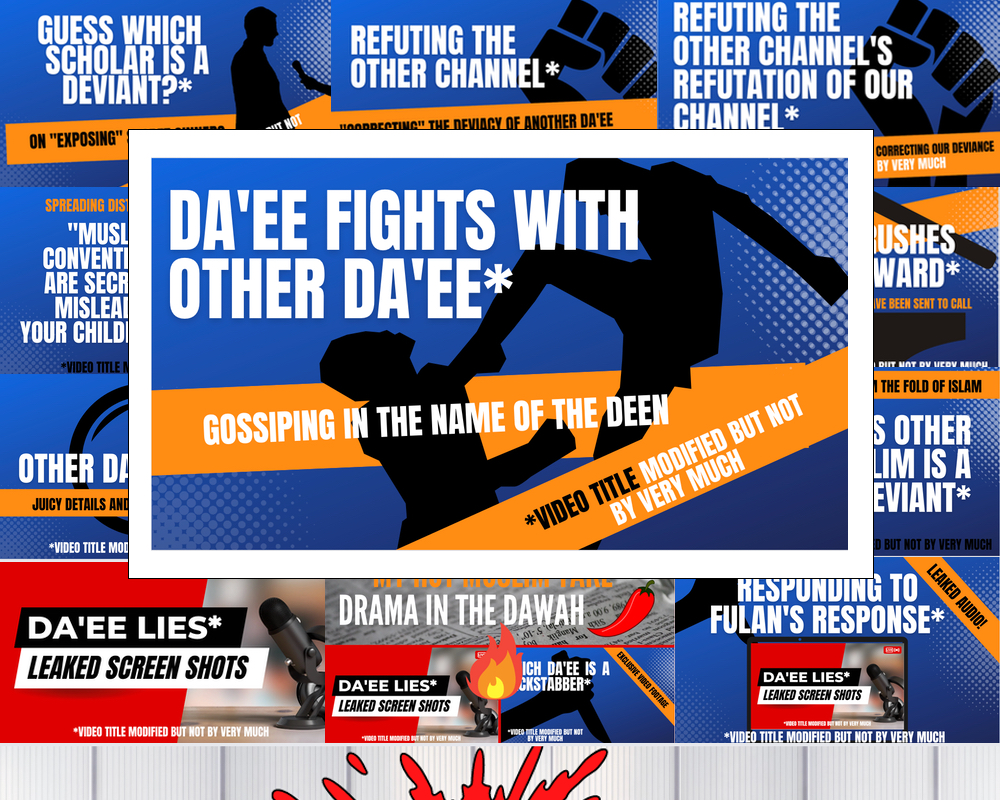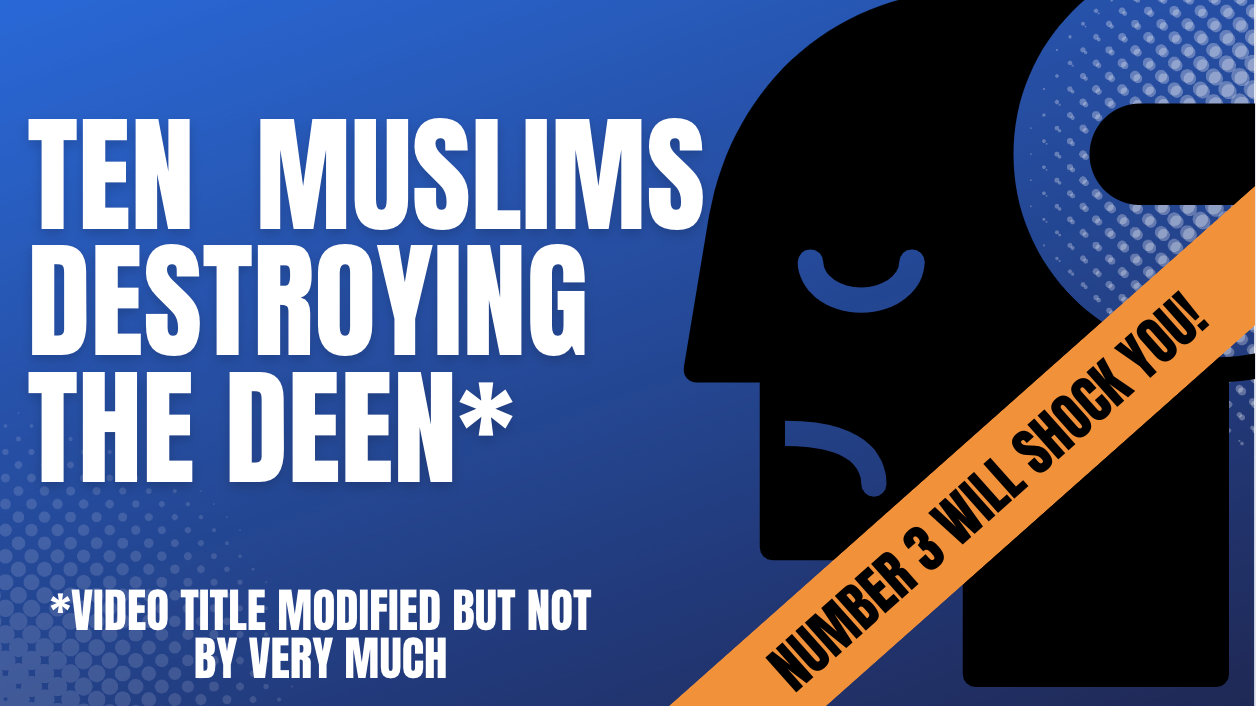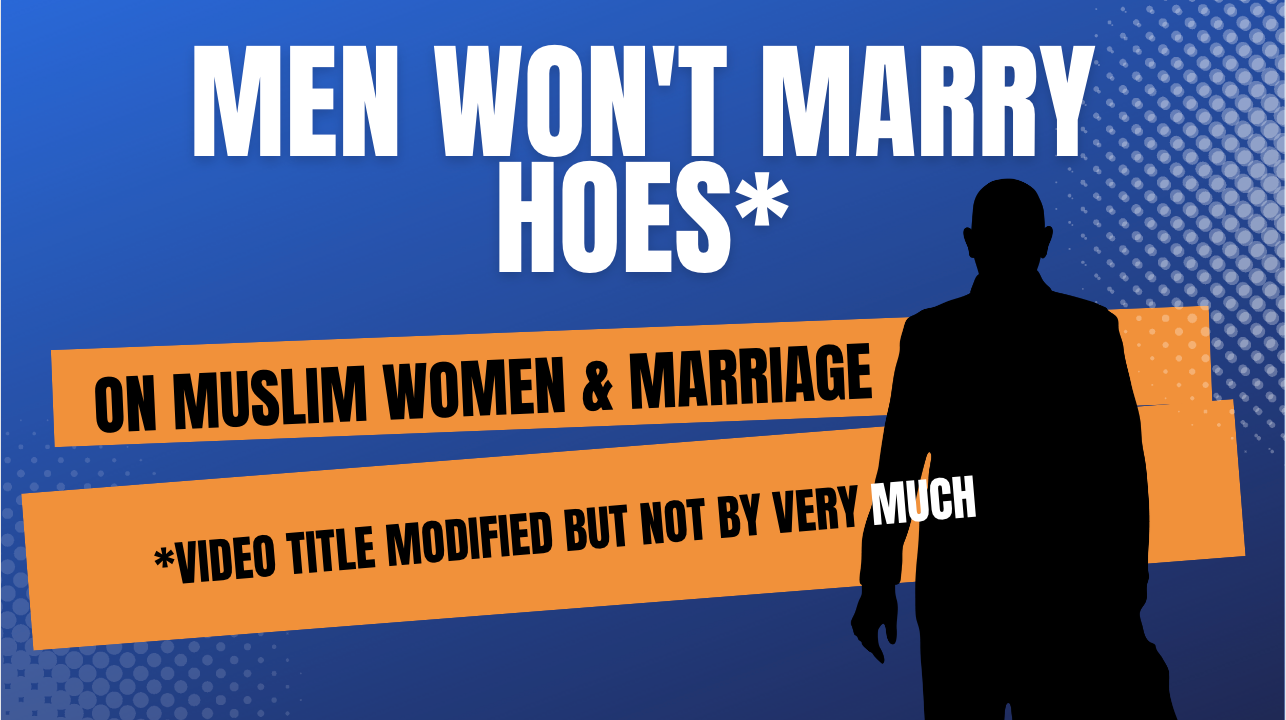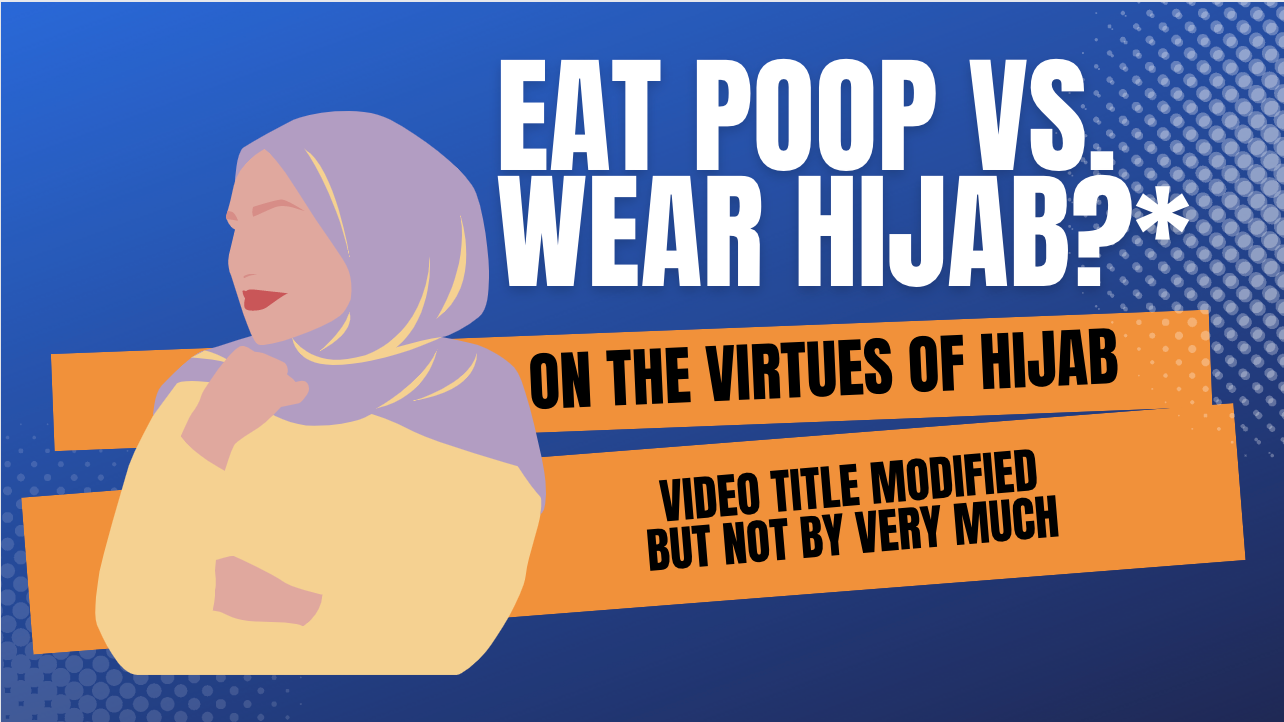#Society
Dirty Da’wah [Part 1] – Insult In The Name Of Islam

Published

The internet can be a nasty place, especially for Muslims. Insults, misrepresentations, attacks against Muslim scholars, and attacks against Muslim themselves are a norm; and I’m not even talking about the grief that non-Muslims give us. I’m talking about the grief we’re giving ourselves in the name of Islam.
Dirty Dawah [Part 2] – “The Satisfying” | Revenge In The Name Of Islam
Muslims making mistakes in public isn’t new to any of us. For as long as Muslims have been human, our scholars and public personalities have been as flawed as those they serve. Where the present diverges from the past though, is in the vast numbers of Muslims negatively affected when it goes wrong.
Keep supporting MuslimMatters for the sake of Allah
Alhamdulillah, we're at over 850 supporters. Help us get to 900 supporters this month. All it takes is a small gift from a reader like you to keep us going, for just $2 / month.
The Prophet (SAW) has taught us the best of deeds are those that done consistently, even if they are small. Click here to support MuslimMatters with a monthly donation of $2 per month. Set it and collect blessings from Allah (swt) for the khayr you're supporting without thinking about it.
Until this very century, a person backbiting their brother might have a handful of witnesses to their sin. Thanks to the internet, they have thousands of witnesses -per platform- for public “da’wah” like this:
“You are a clout-chasing monster… How dare you, as the hypocrite you are – and I mean that in a lughawi (linguistic) way not an istilahi (technical) way, lest you and your friends come along and say oh he’s doing takfeer – Shut up. Shut up, yeah?”
On Da’wah As God Intended
Da’wah is meant to call others – both Muslim and not – to Allah 


ٱدْعُ إِلَىٰ سَبِيلِ رَبِّكَ بِٱلْحِكْمَةِ وَٱلْمَوْعِظَةِ ٱلْحَسَنَةِ ۖ وَجَـٰدِلْهُم بِٱلَّتِى هِىَ أَحْسَنُ ۚ إِنَّ رَبَّكَ هُوَ أَعْلَمُ بِمَن ضَلَّ عَن سَبِيلِهِۦ ۖ وَهُوَ أَعْلَمُ بِٱلْمُهْتَدِينَ ١٢٥
“Invite ˹all˺ to the Way of your Lord with wisdom and kind advice, and only debate with them in the best manner. Surely your Lord ˹alone˺ knows best who has strayed from His Way and who is ˹rightly˺ guided.” The Holy Qur’an, 16:125
۞ وَلَا تُجَـٰدِلُوٓا۟ أَهْلَ ٱلْكِتَـٰبِ إِلَّا بِٱلَّتِى هِىَ أَحْسَنُ إِلَّا ٱلَّذِينَ ظَلَمُوا۟ مِنْهُمْ ۖ وَقُولُوٓا۟ ءَامَنَّا بِٱلَّذِىٓ أُنزِلَ إِلَيْنَا وَأُنزِلَ إِلَيْكُمْ وَإِلَـٰهُنَا وَإِلَـٰهُكُمْ وَٰحِدٌۭ وَنَحْنُ لَهُۥ مُسْلِمُونَ ٤٦
“Do not argue with the People of the Book unless gracefully, except with those of them who act wrongfully. And say, “We believe in what has been revealed to us and what was revealed to you. Our God and your God is ˹only˺ One. And to Him we ˹fully˺ submit.” The Holy Qur’an, 29:46
وَلَا تَسُبُّوا۟ ٱلَّذِينَ يَدْعُونَ مِن دُونِ ٱللَّهِ فَيَسُبُّوا۟ ٱللَّهَ عَدْوًۢا بِغَيْرِ عِلْمٍۢ ۗ كَذَٰلِكَ زَيَّنَّا لِكُلِّ أُمَّةٍ عَمَلَهُمْ ثُمَّ إِلَىٰ رَبِّهِم مَّرْجِعُهُمْ فَيُنَبِّئُهُم بِمَا كَانُوا۟ يَعْمَلُونَ ١٠٨
˹O believers!˺ Do not insult what they invoke besides Allah or they will insult Allah spitefully out of ignorance. This is how We have made each people’s deeds appealing to them. Then to their Lord is their return, and He will inform them of what they used to do. The Holy Qur’an, 6:108
Keeping these and other beautiful requirements in mind, our scholars have explained what it means to have wisdom, gentleness, and good manners when it comes to giving da’wah. Imam Ghazali expanded on this in his response to a Muslim student who asked him for advice. What followed is the famous book Ayyuhal Walad, in which he writes:
“You do not argue with anyone regarding any issue, insofar as you are able, since there is much that is harmful in it, and ‘its evil is greater than its utility.’ For in it [argument] is every ugly character trait, such as insincerity, envy, haughtiness, resentment, enmity, boastfulness, and so on.
Certainly, if an issue arises between you and an individual or a group, and your intention in it is that the truth become known and not lost sight of, discussion is allowed. However, there are two indications of this intention.
The first is that you make no distinction between the truth’s being disclosed on your own tongue or that of someone else. The second is that discussion in private be preferable to you than in public.”
Imam Ghazali’s preference for privacy is meant to distinguish the pursuit of truth from the public cry for attention, in which the truth is an excuse and a Muslim’s honor a victim to its pursuit. His advice here is also proof that the things Muslims struggled with a thousand years ago aren’t so far off from what we’re struggling with now. So let’s talk about this “dirty da’wah.” But first, an important disclaimer.
Disclaimer: We Are Not Naming Names
Muslims scholars in the past have named oppressors, apostates, and fabricators of hadith in order to warn others. They have also named other Muslim scholars in the course of their collective work to preserve Islam and protect its laypeople from being confused or misled, but they did so with both manners and class.
Ibn Qayyim Al Jawziyya, a giant of classical Muslim scholarship, wrote the book Madarij al Saalikeen as an exegesis of Shaykh Harawi’s book, Manazil as-Sa’ireen. In it, he addressed statements that he felt could be dangerously misconstrued. Ibn Qayyim felt that Shaykh Harawi’s words could be taken to mean that humans weren’t responsible for our sins, because we were acting in accordance with the will of God. The spiritual implications of this would be huge. In publicly correcting Harawi’s work, Ibn Qayyim wrote:
“This slip from the Shaykh al-Islam [al-Harawi] does not void his virtues or ruin his status, for his status in scriptural and experiential knowledge and devotion and understanding on the path of spiritual aspiration is well-known… A perfect man is one whose flaws are countable, especially in this difficult field, the arduous battle, in which steps often slip and understanding is often confounded, and the many paths divide the aspirants, and many end up in vales of ruin except a few.”
Translation: This error doesn’t make Shaykh Harawi any less of a scholar. Everyone makes mistakes, and a good scholar can count theirs while the rest of us lose track.
Ibn Qayim’s beautiful clarification is one of the ways that da’ees have dealt with publicly correcting others: they clearly stated the error while maintaining the dignity of the person being corrected. This not only clarified the issue, it elevated the status of the one being corrected as well as the one correcting them. It’s a win-win.
In this article however, I will be following a different, but no less valid, example. I will not naming the people whose errors I am reporting, and this is because:
- The identities of the people sinning are irrelevant to the discussion.
- We’re not here to bring our brothers and sisters down, we’re here to elevate their da’wah back to the level of dignity and decorum that Allah
commanded us to.
- All erring da’ees and influencers have their own dignity and their own rights over us as fellow Muslims. This includes the protection of their honor.
- The work produced by these da’ees is not entirely without value or benefit for the Muslim community. The goal is not to shame or “cancel” entire channels out of existence, but to correct what’s wrong so they can do more of what’s right.
- We all sin, and we all make mistakes. Some of us have the luxury of private sins, but our brothers and sisters whose sins are public are no less deserving of forgiveness of Allah
and the community at large.
While I will be including some screenshots, I will be omitting source links and blurring out identifiers of those making the mistakes featured. In cases where the identities cannot be easily obscured, I will recreate the video thumbnails themselves. The titles will be slightly modified, but I will not be changing the subjects of the videos themselves.
The Prophet 

Takfeer:
The declaring of another Muslim to be a kafir (disbeliever) is a sin called takfeer. It’s bad. It’s so bad, in fact, that the Prophet 
“When a person calls his brother (in Islam) a disbeliever, one of them will certainly deserve the title. If the addressee is so as he has asserted, the disbelief of the man is confirmed, but if it is untrue, then it will revert to him.” [Al-Bukhari and Muslim]
“Whoever calls a man ‘kafir’ [disbeliever] or said ‘O, enemy of Allah’, when he is not one, (the accusation) will rebound to him.” [Al-Bukhari and Muslim]
“A man does not call another as fasiq or kafir, except that he will be the apostate if the other is actually not.” [Al-Bukhari]

Given the danger of getting it wrong, it’s a pretty risky move for anyone, not just Muslims in the field of da’wah, to declare other Muslims to be secretly pagan or deviant, or engaging intentionally in the activities of such. Not only is this dangerous ground for any Muslim to tread on, it’s damaging to the community as a whole.
The credibility of both the attacker and the attacked suffer, and rather than strengthening the Ummah, behavior like this undermines the trust that Muslims need to have in their scholars as well as their da’ees. The end result is disunity, confusion, and a growing sense of distrust in those meant to guide and represent us.
Name calling
يَـٰٓأَيُّهَا ٱلَّذِينَ ءَامَنُوا۟ لَا يَسْخَرْ قَوْمٌۭ مِّن قَوْمٍ عَسَىٰٓ أَن يَكُونُوا۟ خَيْرًۭا مِّنْهُمْ وَلَا نِسَآءٌۭ مِّن نِّسَآءٍ عَسَىٰٓ أَن يَكُنَّ خَيْرًۭا مِّنْهُنَّ ۖ وَلَا تَلْمِزُوٓا۟ أَنفُسَكُمْ وَلَا تَنَابَزُوا۟ بِٱلْأَلْقَـٰبِ ۖ بِئْسَ ٱلِٱسْمُ ٱلْفُسُوقُ بَعْدَ ٱلْإِيمَـٰنِ ۚ وَمَن لَّمْ يَتُبْ فَأُو۟لَـٰٓئِكَ هُمُ ٱلظَّـٰلِمُونَ ١١
“O believers! Do not let some ˹men˺ ridicule others, they may be better than them, nor let ˹some˺ women ridicule other women, they may be better than them. Do not defame one another, nor call each other by offensive nicknames. How evil it is to act rebelliously after having faith! And whoever does not repent, it is they who are the ˹true˺ wrongdoers.” The Holy Qur’an, 49:11
Short of declaring people to be outside of Islam, there are a number of other mistakes whose rectification can only make things better. I say this because name calling always makes things worse. When we attack and berate each other in the name of Islam, it doesn’t matter who’s right and who’s wrong. We all lose respect, we fail to exemplify the sunnah of the Prophet 


If we go a step further and try to use Islam to justify calling each other names in the service of Islam, then we run the risk of misrepresenting Islam. To knowingly misrepresent information is also called lying, and God protect any of us from lying about our how Allah 

The Prophet (peace and blessings of Allah be upon him) said: ‘Do not tell lies about me. Whoever tells lies about me, let him enter the Fire.’” [Al Bukhari, 106]
قُلْ إِنَّ ٱلَّذِينَ يَفْتَرُونَ عَلَى ٱللَّهِ ٱلْكَذِبَ لَا يُفْلِحُونَ ٦٩
Say, ˹O Prophet,˺ “Indeed, those who fabricate lies against Allah will never succeed.” The Holy Qur’an, 10:69
The Messenger of Allah ﷺ said, “Whosoever possesses these four characteristics, is a sheer hypocrite; and anyone who possesses one of them, possesses a characteristic of hypocrisy till he gives it up. (These are:) When he is entrusted with something, he proves dishonest; when he talks, he tells a lie; when he makes a covenant, he acts treacherously; and when he quarrels, he utters foul language.” [Al-Bukhari and Muslim]
When Muslims turn on each other, there are no winners. Except maybe the trolls. Non-Muslims who show up in the comments with popcorn view our dismal conduct as being proof of Islam’s intrinsic inferiority, our poor behavior as evidence of Islam’s hypocrisy, and the aggressive, confrontational tone of the “discussion” as reinforcing of Islamophobic stereotypes like the “angry Muslim male.”
But enough about what Non-Muslims are saying about us, let’s take a look at what we are saying about our selves.
Backbiting, Slander, and Gossip
In Islam, backbiting (gheebah) is defined as speaking about a Muslim in his absence and saying things that he would not like to have spread around, even if they are true. Slander (buhtan) is the act of spreading information that is false, whether in front of that person or behind them, and gossip (nameema) is the act of passing along what you hear about others for the sake of harming them.
Al-Hassan Al-Basri was once told that someone was backbiting him. So, he got a gift and went to the house of the man who backbit him. When the man opened the door and saw Al-Hassan standing with a smile and a gift of dates, the man became surprised as he had no relationship with Al Hassan. As he handed him the gift, Al-Hassan said to him, “I was told today that you gave me some of your hasanaat, so I came to thank you!”
Let us take a moment to appreciate Hassan Al Basri, may Allah 

Bad news for those of us backbiting: we may seek to let the ends justify the means. We may cite being “angry for the sake of Allah 

There are three roles that a Muslim can fit into when backbiting, slander, or gossip occur: perpetrator, victim, or witness, and every one of us will at some point, be every one of these.
When You’re a Perp:


The Messenger of Allah ﷺ said: “Whoever has wronged his brother with regard to his honor or anything else, let him seek his forgiveness today, before there will be no dinar and no dirham, and if he has any good deeds to his credit they will be taken from him in a manner commensurate with the wrong he did, and if he has no good deeds, then some of his counterpart’s bad deeds will be taken and added to his burden.” [al-Bukhari]
We know that good deeds can live beyond their doer – ie Sadaqa Jaariya – but so do bad deeds. Don’t let your words become a type of Gheebah Jaariya, where a single instance of sin can accrue thousands of times over thanks to the magic of the internet.

When You’re a Victim:
As painful, confusing, and sometimes infuriating as being backbitten can be, this might be the best role to play in this drama, or rather – it can be. You can choose to do nothing, and you’ll be earning free good deeds for literally nothing. Or, if there is falsehood spreading that could cause bigger problems, you can choose to address it – but you have to be very, very careful.
Clarifying information about you is not the same thing as launching a counterattack. Protect yourself from going from victim of gheebah to the perpetrator of nameemah in one deceptively smooth motion.
“The powerful man is not the one who can overcome others, but the powerful man is the one who can control himself at the time of anger.” The Messenger of Allah ﷺ
It’s okay to feel angry when you find out someone has been talking trash about you in a public forum, but the feeling has to be separated from whatever action you choose to take. We need to be sure whether we are angry for the sake of Allah 
When You’re a Witness:

The Prophet ﷺ said: “Whoever defends his brother’s honor in his absence, will be entitled to Allah’s protection from the Fire.” [At-Tirmidhi]
Proceed with caution, and try to keep the following advice from the legendary Imam Nawawi in mind:
“Know that in the same way that backbiting is forbidden for the one who speaks it, it is likewise forbidden for the one who listens to it and approves of it.
Thus, it is obligatory on the one who hears an individual embarking on committing the prohibited form of backbiting, to forbid him from doing it as long as he does not fear any open harm resulting from that.
But if he does fear (harm) from that, then he is obligated to reject the backbiting with his heart and to detach himself from that gathering if he is able to do so.”1https://balagha.net/guarding-the-tongue
In short: backbiting is haram to speak as well as hear. It’s your responsibility to say something that makes the situation better, but not worse. If you can’t do that, then leave.
If you choose to comment, remind your brother or sister the same way that you would like to be reminded. You can call them to better behavior without belittling, humiliating, or cursing them. If you think saying something will only make things worse, then you may leave the virtual gathering by unfollowing, unsubscribing, or in some other way distancing yourself from the sin and avoiding future exposure to it.
Vulgarity:
Abū Hurayrah رضي الله عنه narrates that the Prophet ﷺ said, “Ḥayāʾ is from faith, and faith is in Paradise. And vulgarity is from callousness, and callousness is in the Hellfire.”

I will make these instances are brief as possible. If you don’t want to read them, scroll past the tiny font to the big blue image and the header: It’s Safe to Read From Here
The following are unmodified, unedited quotes from Muslim influencers in the field of da’wah, made on public channels and directed to the public audience.
-
“How about you and [name withheld] engage in some sort of sexual activity. How about you get on your knees. There has to be some kind of foreplay.”
-
“The woman on top position, it makes the man behave like a woman.”
-
“…the LGBT, I refer to them as rectum-sex enthusiasts.”
-
“-whore islamophobes”
-
“I had sex with my auntie and married her daughter | Naseeha Session”
-
“In atheism there’s nothing wrong with drinking your dad’s sperm.”
It’s Safe to Read From Here
The offensive, inappropriate nature of this – literally – dirty talk in da’wah has been called out by Muslims and non-Muslims alike. There is no excuse for it. There’s no justification for Muslims to be this shameless in promoting a religion characterized by modesty (haya) and good manners. The Prophet ﷺ deemed haya to be the very hallmark of Islam when he said, “Every religion has its signature character trait, and the signature character trait of Islam is haya.”2Muḥammad b. Yazīd al-Qazwīni Ibn Mājah, Sunan Ibn Mājah (Cairo: Dār Iḥyāʾ al-Kutub al-ʿArabīyah, 2011), no. 4181; authenticated by al-Albānī.
To Be Continued…
In the short term, sexual content, juicy gossip, leaked emails, and incriminating screenshots can be great for hits and views, and help build audiences when da’ees join together against a common target. A video against a Muslim scholar (the bigger the better) can even help put otherwise unknown da’ees on the map through sheer force of controversy alone, and a significant amount of “exposing” is directed towards those considered to be “celebrity” Imams and scholars.
But heads up- if the end goal of da’wah is to earn Jannah by doing the things that make Allah 

I believe that the overwhelming majority of Muslim da’ees online are sincerely working for the sake of Allah 

****
Dirty Dawah [Part 2] – “The Satisfying” | Revenge In The Name Of Islam
Related reading:
– Naseehah: The Art Of Giving Islamic Advice And Dawah Online #FiqhOfSocialMedia
Naseehah: The Art Of Giving Islamic Advice And Dawah Online #FiqhOfSocialMedia
– The Difference Between Ibn Ali And Everyone Else (The Need For Authentic Dawah)
The Difference Between Ibn Ali And Everyone Else (The Need For Authentic Dawah)
Keep supporting MuslimMatters for the sake of Allah
Alhamdulillah, we're at over 850 supporters. Help us get to 900 supporters this month. All it takes is a small gift from a reader like you to keep us going, for just $2 / month.
The Prophet (SAW) has taught us the best of deeds are those that done consistently, even if they are small. Click here to support MuslimMatters with a monthly donation of $2 per month. Set it and collect blessings from Allah (swt) for the khayr you're supporting without thinking about it.
Zeba Khan is the Editor at Large - Special Needs for MuslimMatters.org, as well as a writer, speaker, and advocate for social justice. In addition to having a child with autism, she herself lives with Ehlers-Danlos Sydrome, Dysautonomia, Mast-Cell Activation Disorder, and a random assortment of acronyms that collectively translate to chronic illness and progressive disability. She is also an enthusiastic student of martial arts.


Nationalism And Its Kurdish Discontents [Part II of II]: Kurds And Turkiye After Ottoman Rule

Nationalism And Its Kurdish Discontents [Part I of II]: Kurds In An Ottoman Dusk

Moonshot [Part 10] – The Marco Polo

Moonshot [Part 9] – A Religion For Real Life

Genocidal Israel Escalates With Assault On Iran

Moonshot [Part 10] – The Marco Polo

Moonshot [Part 9] – A Religion For Real Life

Moonshot [Part 8] – The Namer’s House

Moonshot [Part 7] – The Abyss Stares Back

[Dhul Hijjah Series] Calling Upon the Divine: The Art of Du’a (Part 3)

[Dhul Hijjah Series] Calling Upon the Divine: The Art of Du’a (Part 1)

IOK Ramadan 2025: Four Steps | Sh Zaid Khan

IOK Ramadan 2025: Do Your Best | Sh Zaid Khan

IOK Ramadan 2025: Giving Preference to Others | Sh Zaid Khan






















Jakir Ahmed
November 9, 2022 at 4:48 PM
A teacher of mine shared the following statement of al-Imam, al-Allamah, Hafidh Ibn Muflih (Rahimahullah):
Don’t feel sad about the unpleasant statements that people make about you, for if the statement is untrue then it will be counted as a good deed on your scales which you never did. But if it is true then it’s a sin of yours which you received the punishment for early, so it’s over with.
MMreader
November 11, 2022 at 12:29 AM
The people who promote fahisha and degeneracy in society, especially Muslims, absolutely deserve to be condemned and cancelled publicly. Those who introduce misguided ideologies into the Muslims, run cover for intelligence agencies under the guise of “counter terrorism”, dismiss the Shariah as barbaric, support the right to criticize the Prophet (s.a.w.), seek to ‘reform’ the perfect deen of Allah, are most definitely deserving of censure and castigation.
Those who provide a platform for such degenerates to air their filth and mislead Muslims also deserve condemnation.
NOS
November 11, 2022 at 12:03 PM
MMReader you can criticize those behaviors without assuming you will be better than them with Allah on qiyamah, or misbehaving in your manner of critiquing their actions now.
MA
November 25, 2022 at 6:50 PM
JazakAllah khairan katheeran for such a needed and important article! May Allah bless you in deen and dunya, Ameen ya rabbul aalameen